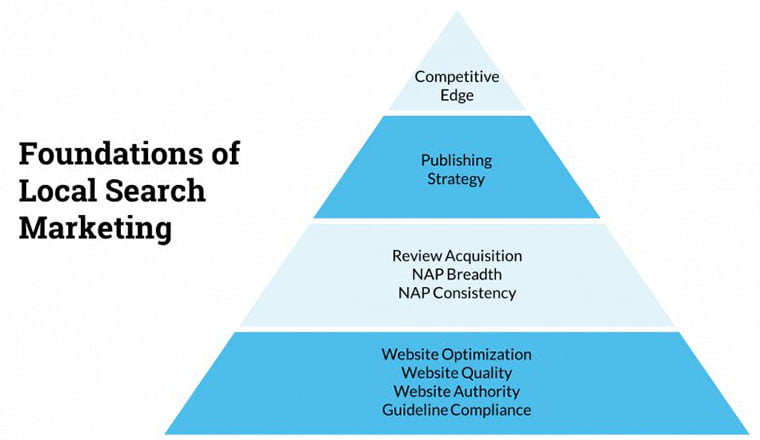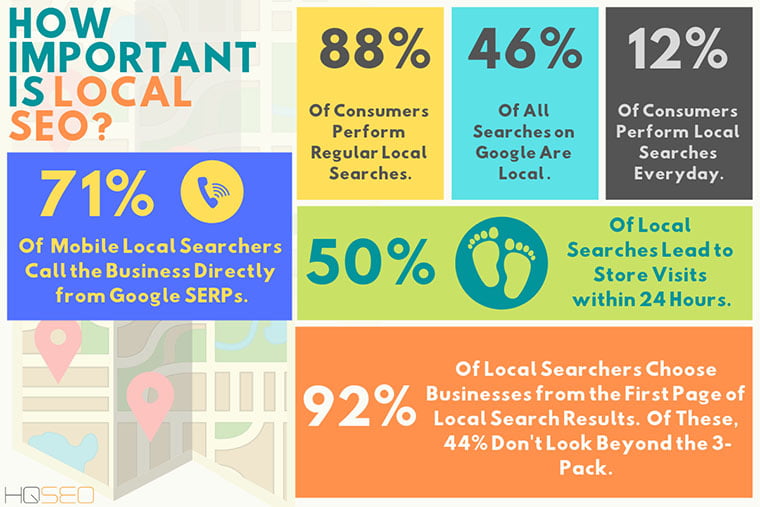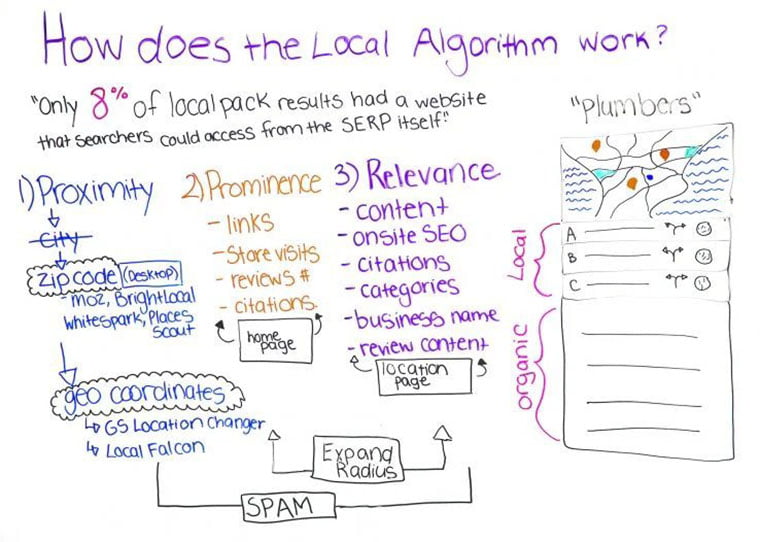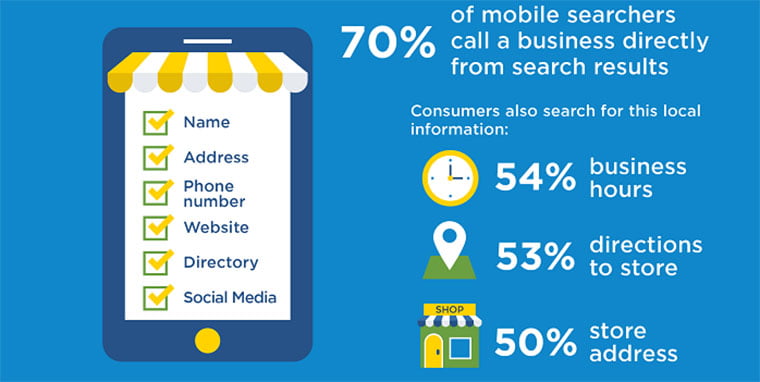Are you wondering what local SEO is and whether it’s relevant or valuable to your business? Our comprehensive guide will give you the rundown of optimising your local SEO search engine results, why it’s essential for your business online and why it should be a key consideration in your marketing strategy.
What is local SEO?
Local search engine optimisation (SEO) is how a business ranks in local search engine queries. You can improve your local search visibility if you optimise for local searches as part of your online business marketing strategy.
 Image credit: Moz
Image credit: Moz
Improving your local rankings will lead to more potential customers and higher conversion rates, meaning you can grow your business, even locally, online.
Local SEO incorporates your local business information being available in local Google searches, which includes:
- Business name.
- Business address and phone number.
- Business website.
- Business types.
Focusing on local search ranking can improve your online presence, increase your inbound marketing numbers and ultimately provide healthy development for your business.
Google’s Local Pack feature in local search results is the peak of local search rankings. The top local business listings appear at the top of search engine results pages and, of course, receive more clicks and visits than businesses that appear further down the page.
Is local SEO dead?
Local SEO matters. A localised SEO strategy could be vital for your company. With 46% of all Google searches being linked to something local, the advantage of local SEO cannot go unnoticed.
 Image credit: SERPWizz
Image credit: SERPWizz
Suppose almost half of all search queries are local. In that case, many potential customers could see your business listing if you commit to optimising your SEO as part of your digital marketing strategy.
Need any more proof? According to one study, 88% of local business searches on mobile devices result in local customers visiting or calling the business within 24 hours.
You know the importance of your local results in Google My Business Listings, but how do you get there? The first thing you need to do is understand how the local search ecosystem works.
How does local SEO work?
Local SEO, in theory, works just like any other Google search. But Google uses a different set of local search ranking factors to rank local listing result pages. Each ranking factor you should take into account are as follows:
- The location a person is searching from.
- Name address and phone number (NAP) citations. Online references to a business’ name, address and phone number.
- Google My Business (GMB) listings.
- Local keyword use on your Google My Business profile.
- The number of ‘check-ins’ at a location.
- Google map star rating for a specific location/venue/business. How reliable and positive online reviews are.
There are other factors, too, such as how many shares on social media sites which will mean that local SEO could (or should) be a consideration in your social media marketing and broader digital marketing strategy. Consider adding a Facebook ad campaign with local intent to your more comprehensive SEO strategies.
 Image credit: Moz
Image credit: Moz
Local organic search results worked after Google analysed a vast amount of data. When you seek something online, Google’s local search algorithm allows you to see immediate results in your immediate location.
Optimising for localised content has revolutionised the way search engines work. Focusing on boosting your business profile for how Google ranks localised content can improve your lead generation, which will mean more business success.
How to improve local SEO?
Understanding how local SEO works is the first part of the puzzle to improve your rankings in local search results. Using this base knowledge will help you begin the process of shooting up the search rankings and capitalising on better organic results.
Optimise your website and utilise on-page SEO for all of your locations (mainly if you are a multiple location company).
Create unique local landing pages for each location and ensure you follow the SEO basics. Include name, address, phone number, and other location-specific data on your page for each physical location.

Other local SEO tips to improve your Google business ranking include the following:
- Local link building to help optimise your website.
- Optimise title tags and meta descriptions to improve your search rankings.
- Website content is just as important. But so are reviews, such as local citations and Google My Business.
- Utilise local SEO tools to develop your local SEO audits.
- Develop keyword research based on your potential local customer base.
- Build deep internal links to core pages that matter, e.g. service pages.
A well-rounded approach to improving your ranking in online business directories will improve your local pack results.
Remember, Google ranks local businesses on many ranking factors and only if you consider all of them and follow robust local SEO strategies to maximise your listings.
What is the importance of SEO at a local level?
Local SEO can have a significant impact on your business. From business categories to names, addresses, phone numbers, and online reviews, the online search landscape and search algorithms have altered the way businesses can be discovered by local customers.
The way consumers use search engines in 2022 is as much for local businesses as anything else. Whether they’re in their residential town or on a trip to a different city, optimising your local SEO can hugely positively affect your company.
Summing up
Use every marketing tool to improve your local SEO as part of your overall online presence, and there’s a massive opportunity for growth.
It’s pretty simple in the modern world and the advances in technical SEO. Improving your local SEO ranking can boost your brand awareness, conversion rate, and ultimately sales.
To achieve local SEO results, get in touch with BlindSeer today. We specialise in local SEO, global SEO strategies, search marketing and conversion rate optimisation.
David Schneider is the owner & founder of BlindSeer. He has over 8 years of experience in SEO. In addition he offers a unique viewpoint on the way SEO works with over six years previously working in Human Intelligence understanding how people think & act and how to drive people to take action.